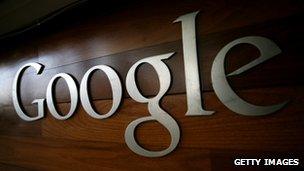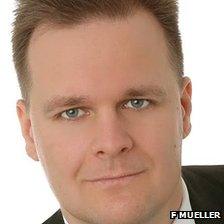Oracle confirms paying a blogger but Google names no-one
- Published

Google's lawyers said they needed more guidance before they could release any names
Oracle has disclosed two names after it and Google were ordered to reveal financial ties to people who might have influenced coverage of a trial.
The instruction had been given by a US judge following a copyright and patent lawsuit fought by the two tech firms.
Oracle said it had relationships with blogger Florian Mueller and Stanford University's Prof Paul Goldstein.
Google said it did not pay any "journalists, bloggers, or other commentators to write about this case".
However, the search giant added that it needed further guidance before being able to disclose others it had financial ties to.
The judge had said he was "concerned" that financial relationships might have influenced analysis published in newspapers and on the net.
The trial had centred on Oracle's claim that it was owed about $1bn (£640m) in compensation for Google's use of its technologies in the Android system.
But the jury ruled that the patents involved had not been breached, while a judge dismissed the key copyright claim - a decision against which Oracle has said it would "vigorously appeal".
Oracle is one of the world's biggest technology firms specialising in computer servers, databases and other services to industry. Its systems power many of the online services used by smartphone and PC users.
Patent blogger payments
Shortly after the trial began, Mr Mueller had revealed that he was providing consultancy services to Oracle.
The German blogger's articles are widely read by industry professionals and he was recently quoted by a UN agency in a press release about patent disputes.

Oracle said blogger Mr Mueller had revealed he was being paid in April
"In April, I proactively announced a broadly focused consulting relationship with Oracle, six months after announcing a similar working relationship with Microsoft," he told the BBC ahead of Oracle's filing.
"I can also certify that I wrote all of my blog posts on the trial independently, without being directed or influenced by anyone.
"All the information I received from Oracle itself was what the company uploaded to its website on each trial day. With the exception of the disclosure statement, Oracle never saw my posts, in whole or in part, before they went live."
Oracle said it was naming Prof Goldstein "out of an abundance of caution" since he had advised a law firm used by the company about copyright, even though he did not specifically comment about the lawsuit in question.
The firm added that some of its employees might also have blogged about the case, but said that it "did not ask or approve" this action.
Google wants guidance
In its submission to California's Judge Alsup, Oracle also accused Google of maintaining an extensive network of "attorneys, lobbyists, trade associations, academics and bloggers".
It added that it believed that Google "brought this extensive network of influencers to shape public perceptions concerning the position it was advocating throughout this trial".
Google said that it had not been involved in any "quid pro quo" arrangements for coverage.
However, it did acknowledge that it had a financial connection with several types of people and organisations who it did not name, including:
Universities and non-profit entities
Organisations to which it belonged or to which it had made contributions
Bloggers and others who had adverts placed by its advertising program on their site, and had commented about the case
Its own employees and contractors who might have commented about the trial
Expert consultants
Witnesses identified for the trial
Its lawyers asked for clarification as to how far they should go in naming those who fell into each category.
They said they had not provided a full list at this time to "avoid flooding the court with long lists of such individuals or organisations".
- Published8 August 2012
- Published1 June 2012
- Published24 May 2012